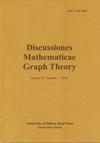群不变图的Burnside色多项式
IF 0.8
4区 数学
Q3 MATHEMATICS
引用次数: 0
摘要
摘要引入了一类图在群作用下不变的Burnside色多项式。这是Zaslavsky为增益图引入的q色函数的推广。给定一个作用于图G和𝕲-set X的群本文章由计算机程序翻译,如有差异,请以英文原文为准。
Burnside Chromatic Polynomials of Group-Invariant Graphs
Abstract We introduce the Burnside chromatic polynomial of a graph that is invariant under a group action. This is a generalization of the Q-chromatic function Zaslavsky introduced for gain graphs. Given a group 𝕲 acting on a graph G and a 𝕲-set X, a proper X-coloring is a function with no monochromatic edge orbit. The set of proper colorings is a 𝕲-set which induces a polynomial function from the Burnside ring of 𝕲 to itself. In this paper, we study many properties of the Burnside chromatic polynomial, answering some questions of Zaslavsky.
求助全文
通过发布文献求助,成功后即可免费获取论文全文。
去求助
来源期刊

Discussiones Mathematicae Graph Theory
MATHEMATICS-
CiteScore
2.20
自引率
0.00%
发文量
22
审稿时长
53 weeks
期刊介绍:
The Discussiones Mathematicae Graph Theory publishes high-quality refereed original papers. Occasionally, very authoritative expository survey articles and notes of exceptional value can be published. The journal is mainly devoted to the following topics in Graph Theory: colourings, partitions (general colourings), hereditary properties, independence and domination, structures in graphs (sets, paths, cycles, etc.), local properties, products of graphs as well as graph algorithms related to these topics.
 求助内容:
求助内容: 应助结果提醒方式:
应助结果提醒方式:


